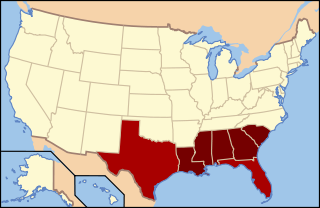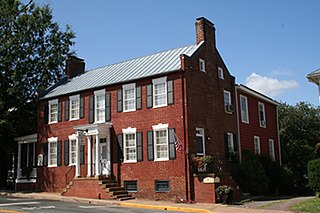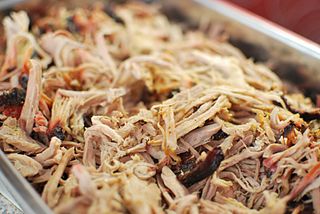Related Research Articles

The cuisine of the Southern United States encompasses diverse food traditions of several subregions, including Tidewater, Appalachian, Ozarks, Lowcountry, Cajun, Creole, African American Cuisine and Floribbean cuisine. In recent history, elements of Southern cuisine have spread to other parts of the United States, influencing other types of American cuisine.

The Deep South or the Lower South is a cultural and geographic subregion of the Southern United States. The term was first used to describe the states which were most economically dependent on plantations and slavery. After the American Civil War ended in 1865, the region suffered economic hardship and was a major site of racial tension during and after the Reconstruction era. Before 1945, the Deep South was often referred to as the "Cotton States" since cotton was the primary cash crop for economic production. The civil rights movement in the 1950s and 1960s helped usher in a new era, sometimes referred to as the New South. The Deep South is part of the highly-religious, socially conservative Bible Belt and is currently a Republican Party stronghold.
Clyde Norman Wilson is an American retired professor of history at the University of South Carolina, a paleoconservative political commentator, a long-time contributing editor for Chronicles: A Magazine of American Culture and Southern Partisan magazine, and an occasional contributor to National Review.

Southern United States literature consists of American literature written about the Southern United States or by writers from the region. Literature written about the American South first began during the colonial era, and developed significantly during and after the period of slavery in the United States. Traditional historiography of Southern United States literature emphasized a unifying history of the region; the significance of family in the South's culture, a sense of community and the role of the individual, justice, the dominance of Christianity and the positive and negative impacts of religion, racial tensions, social class and the usage of local dialects. However, in recent decades, the scholarship of the New Southern Studies has decentralized these conventional tropes in favor of a more geographically, politically, and ideologically expansive "South" or "Souths".

The culture of the Southern United States, Southern culture, or Southern heritage, is a subculture of the United States. From its many cultural influences, the South developed its own unique customs, dialects, arts, literature, cuisine, dance, and music. The combination of its unique history and the fact that many Southerners maintain—and even nurture—an identity separate from the rest of the country has led to it being one of the most studied and written-about regions of the United States.

The I-house is a vernacular house type, popular in the United States from the colonial period onward. The I-house was so named in the 1930s by Fred Kniffen, a cultural geographer at Louisiana State University who was a specialist in folk architecture. He identified and analyzed the type in his 1936 study of Louisiana house types.
Timothy B. Tyson is an American writer and historian who specializes in the issues of culture, religion, and race associated with the Civil Rights Movement. He is a senior research scholar at the Center for Documentary Studies at Duke University and an adjunct professor of American Studies at the University of North Carolina.
Kathleen Marie Higgins is an American Professor of Philosophy at the University of Texas at Austin where she has been teaching for over thirty years. She specializes in aesthetics, philosophy of music, nineteenth and twentieth-century continental philosophy, and philosophy of emotion.
The bibliography of the American Civil War comprises books that deal in large part with the American Civil War. There are over 60,000 books on the war, with more appearing each month. Authors James Lincoln Collier and Christopher Collier stated in 2012, "No event in American history has been so thoroughly studied, not merely by historians, but by tens of thousands of other Americans who have made the war their hobby. Perhaps a hundred thousand books have been published about the Civil War."
John Egerton was an American journalist and author known for his writing on the Civil Rights Movement, Southern food, history of the South, and Southern culture.

The Center for the Study of the American South (CSAS) is an academic organization dedicated to the study of "southern history, literature, and culture as well as ongoing social, political, and economic issues" at the University of North Carolina at Chapel Hill.

The history of slavery in Missouri began in 1720, predating statehood, with the large-scale slavery in the region, when French merchant Philippe François Renault brought about 500 slaves of African descent from Saint-Domingue up the Mississippi River to work in lead mines in what is now southeastern Missouri and southern Illinois. These were the first enslaved Africans brought in masses to the middle Mississippi River Valley. Prior to Renault's enterprise, slavery in Missouri under French colonial rule had a much smaller scale compared to elsewhere in the French colonies. Immediately prior to the American Civil War, there were about 100,000 enslaved people in Missouri, about half of whom lived in the 18 western counties near the Kansas border.

Barbecue is a tradition often considered a quintessential part of American culture, especially the Southern United States.

Dixie, also known as Dixieland or Dixie's Land, is a nickname for all or part of the Southern United States. While there is no official definition of this region, or the extent of the area it covers, most definitions include the U.S. states below the Mason–Dixon line that seceded and comprised the Confederate States of America, almost always including the Deep South. The term became popularized throughout the United States by songs that nostalgically referred to the American South.

Kelly Cherry was an American novelist, poet, essayist, professor, and literary critic and a former Poet Laureate of Virginia (2010–2012). She was the author of more than 30 books, including the poetry collections Songs for a Soviet Composer, Death and Transfiguration, Rising Venus and The Retreats of Thought. Her short fiction was reprinted in The Best American Short Stories, Prize Stories: The O. Henry Awards, The Pushcart Prize, and New Stories from the South, and won a number of awards.

Barbecue is an important part of the heritage and history of the U.S. state of North Carolina. It has resulted in a series of bills and laws that relate to the subject, and at times has been a politically charged subject. In part, this is due to the existence of two distinct types of barbecue that have developed over the last few hundred years: Lexington style and Eastern style. Both are pork-based barbecues but differ in the cuts of pork used and the sauces they are served with. In addition to the two native varieties, other styles of barbecue can be found throughout the state.

Poor White is a sociocultural classification used to describe economically disadvantaged Whites in the English-speaking world, especially White Americans with low incomes.

A barbecue sandwich is a sandwich that is typically prepared with barbecued meats. Several types of meats are used to prepare barbecue sandwiches. Some varieties use cooked meats that are not barbecued, but include barbecue sauce. Many variations, including regional variations, exist, along with diverse types of cooking styles, preparations and ingredients.
Henry Hughes (1829–1862) was an American lawyer, sociologist, state senator, and Confederate Colonel from Mississippi. He developed the economic notion of warrantism and supported the re-establishment of the African slave trade.
White Southerners, are White Americans from the Southern United States, originating from the various waves of Northwestern European immigration to the region beginning in the 17th century. A semi-uniform white Southern identity coalesced during the Reconstruction era partially to enforce white supremacism in the region.
References
- ↑ "Dale Volberg Reed". Legacy. Retrieved August 26, 2021.